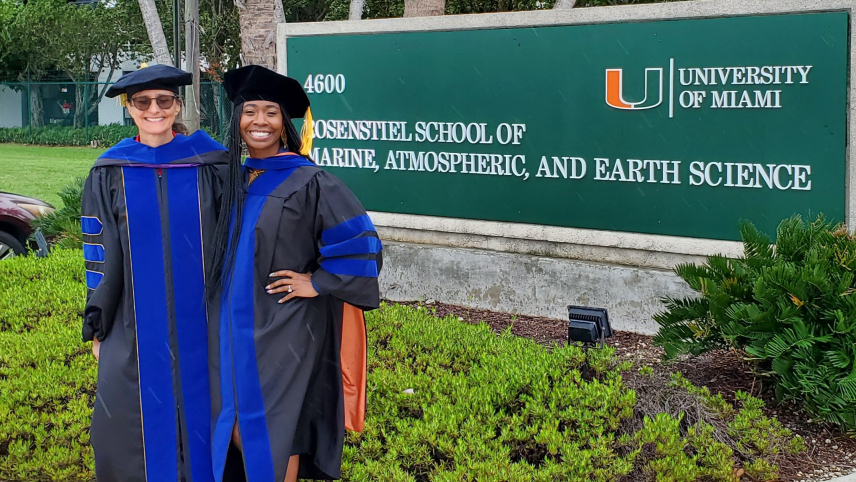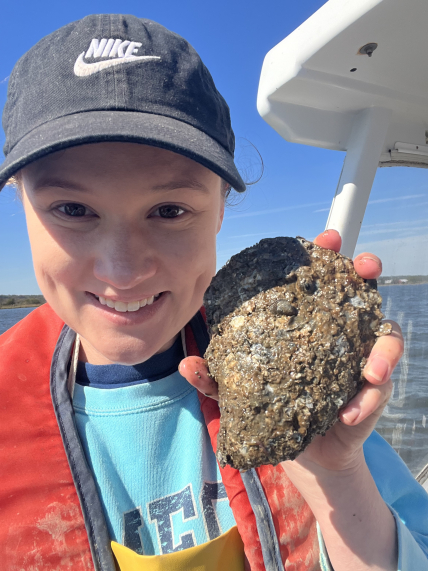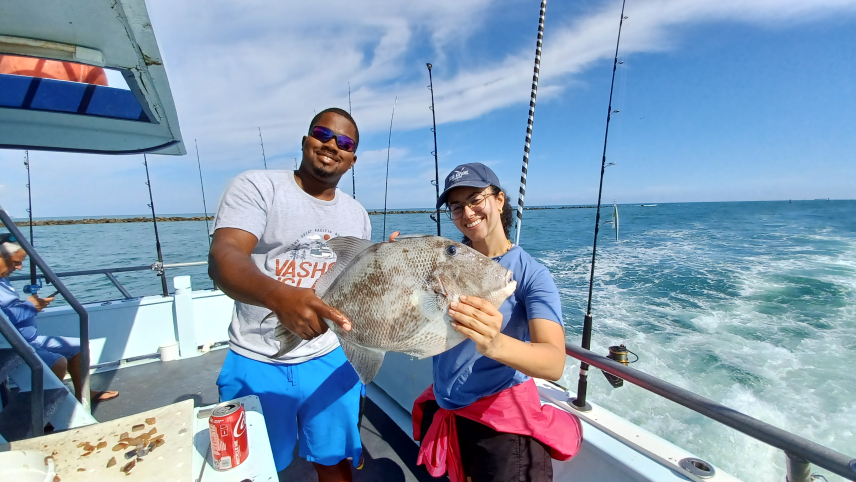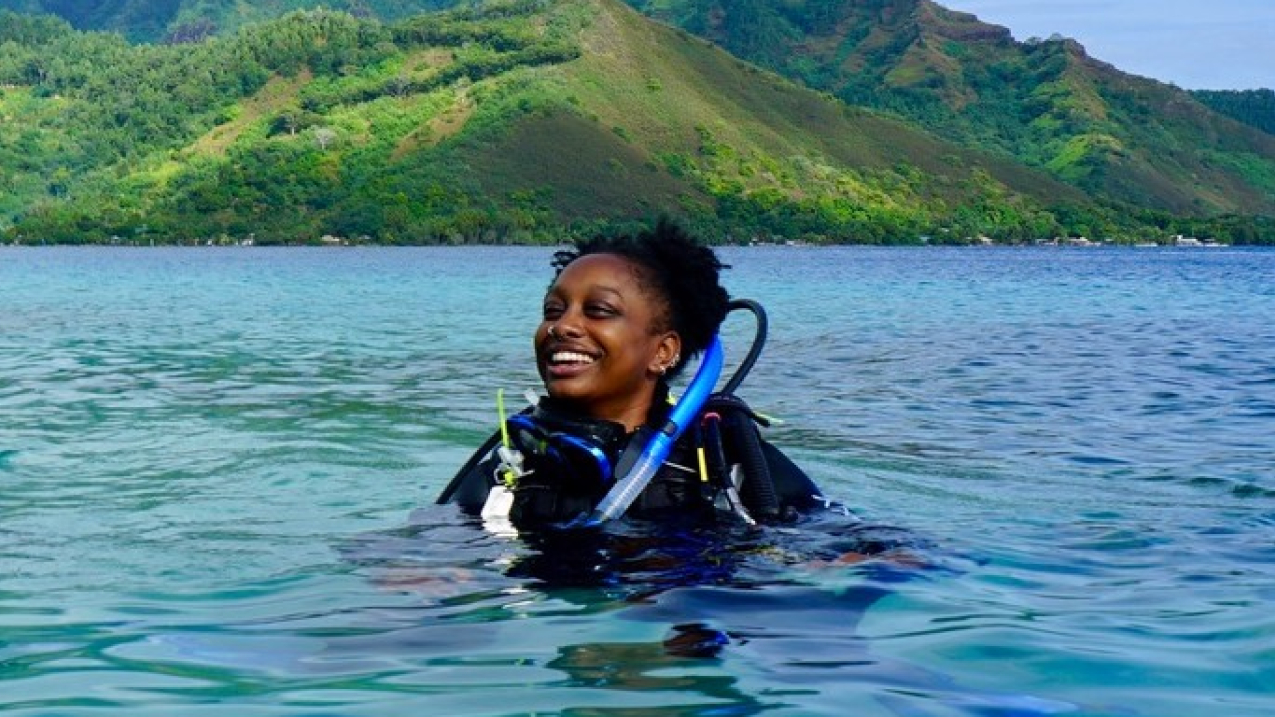January 2024 highlights
 Spotlight on recent graduates from NOAA LMRCSC-I and II
Spotlight on recent graduates from NOAA LMRCSC-I and II
NOAA LMRCSC-I Fellow Adrianne Wilson offsite link graduated from University of Miami – Rosenstiel School of Marine, Atmospheric, and Earth Sciences with a Ph.D. in marine biology and ecology. Her dissertation is titled, "Age, Growth and Genetic Diversity of Lane Snapper, a Data Limited Species." She will take on a postdoctoral position with the North Gulf Institute at Mississippi State University, based at NOAA's Atlantic Oceanographic and Meteorological Laboratory in Miami. As a postdoc, Adrianne will use eDNA and eRNA to evaluate the biodiversity of microbes in the Northern Gulf of Mexico and their roles in the biological carbon pump.

NOAA LMRCSC-II Fellow Jasmine Smalls offsite link graduated from the University of Maryland Eastern Shore with a Ph.D. in food and agricultural science with specialization in environmental microbiology. Her dissertation is titled, “Abundance, Antibiotic Resistance, Genetic Diversity of Vibrio spp. and Diversity of Microbial Communities in Blue Crabs and Seawater from the Maryland Coastal Bays.” Jasmine plans to make her career as an interdisciplinary environmental/seafood safety scientist.
NOAA LMRCSC-II Fellow Kaitlynn Wade offsite link graduated with her master’s degree from the Marine Estuarine Environmental Sciences Program at the University of Maryland Center for Environmental Science – Chesapeake Biological Laboratory, studying the spatial distribution and environmental preferences of Jonah and Atlantic rock crabs. Her thesis was titled, “Effects of Environmental Variables and Changes in Seasonal Patterns on Spatial Distributions of Jonah crabs (Cancer borealis) and Atlantic rock crabs (Cancer irroratus) in Georges Bank and the Mid-Atlantic Bight, USA.” Kaitlynn will now be working as a faculty research assistant mentored by Michael Wilberg, Ph.D., at the Chesapeake Biological Laboratory evaluating the impacts of oyster restoration on key Chesapeake Bay species and helping with the Maryland oyster stock assessment.

NOAA LMRCSC-II Fellow Noah Tait offsite link graduated with his master’s degree in biological sciences with a concentration in environmental science from Hampton University, studying the socio-ecological impacts on the Chesapeake Bay and its fisheries. Noah’s thesis was titled, “Developing a Coupled Human Socio-Ecological System for Chesapeake Bay Shellfish Fisheries.” He recently presented his research publicly as part of the NOAA Science Seminar Series. Noah aims to pursue a career in fisheries management.
NOAA LMRCSC-II Fellow Leanne Cohn offsite link graduated from Oregon State University with a master’s degree in marine resource management, after studying the biological, environmental, and socio-economic impacts of renewable wind energy efforts off the coast of Oregon. The title of her thesis is “Using GIS to Illustrate the Geospatial and Socioecological Intersection Between Climate Change, Energy, and Fisheries on the U.S. West Coast.”
October 2023 highlights
October 2023 feature story
Selected highlights
Student spotlight: Ph.D. fellow spreads awareness through fishing club offsite link
Chryston Best-Otubu offsite link is a Ph.D. student and LMRCSC fellow at the University of Miami. He started a successful fishing club, which now includes 20 graduate students, both for the love of this recreational hobby and as a way to spread conservation efforts.

Future fellows gain marine science exposure offsite link
LMRCSC lead institution University of Maryland Eastern Shore (UMES) welcomed bright and enthusiastic research interns to campus this summer. Students in the Research Experience for Undergraduates Program offsite link and Geoscience Bridge Program offsite link benefitted from workshops, seminars, and hands-on field days with esteemed faculty, including LMRCSC Director Paulinus Chigbu. Ph.D., and Deputy Director Margaret Sexton, Ph.D.
The internships wrapped up on August 3rd, when students presented their research findings at a symposium on the UMES campus.
Master’s fellow earns Sea Grant Knauss Fellowship
LMRCSC master's fellow Caitlyn Czajkowski, a student at Delaware State University, was named a National Sea Grant College Program finalist for the 2024 class of the John A. Knauss Marine Policy Fellowship program.
Fellows gather for annual assembly at the Institute of Marine and Environmental Technology offsite link
LMRCSC fellows came from seven partner institutions across the U.S. to meet in Baltimore at the 2023 Annual Assembly. New and veteran fellows convened at the Institute of Marine and Environmental Technology to network, workshop, and gain insight into their marine science career prospects.


